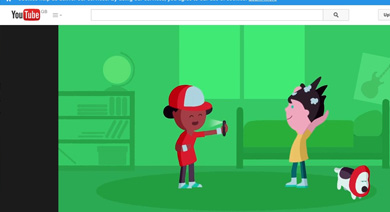In line with good practice, Down News supports local police in their efforts to remind young people of the importance of staying safe online.
[caption id="attachment_54210" align="alignleft" width="390"] Be very beware: taking personal photos and putting them on the Internet can put you or your friends in danger[/caption]
Be very beware: taking personal photos and putting them on the Internet can put you or your friends in danger[/caption]
Supporting the recently launched NSPCC campaign Share Aware, a public education campaign aimed at helping parents talk to their children about staying safe online, as well as encouraging providers to take action to make their sites safer for children, Detective Inspector Richard Graham, said: “Social media plays a large part in the lives of most young people so it is more important now than ever that they know how to protect themselves and stay safe online.
“Social media has now become an integral part of online life for a lot of people and is an excellent way of keeping in touch, however users need to be careful about how much information they share online and with whom they share said information. By following the tips below, you can ensure your safety online.”
* Privacy and security settings – it is important to learn about security settings on social networking sites. They often change these settings on a regular basis and will help you to control who can see what you post. You wouldn’t leave your front door open would you? Why let anyone access your online profile?
* Don’t accept people you do not know as friends– many users accept people they don’t know as friends. Who really has 2000 ‘friends’!?
* Remember: What you post online stays online – consider your online reputation and digital footprint. Would you show these images or make these statements to your parents or future employers? Imagine if those pictures were put on a billboard for everyone to see, how would you feel?
* Keep personal information private – be careful about how much information you post online.
? Do you post your Snapchat and BBM usernames/codes online for others to see, are you leaving yourself open to unwanted contact?
? Do you post your email address and/or mobile number online?
? Are there pictures of you in your school uniform? Remember this can be used to identify you and your friends. Would you let just anyone look through your personal belongings?
* Passwords – It’s simple, remember to make passwords strong – a mixture of random words and numbers. Treat passwords like your toothbrush – don’t let anyone else use them!
*Be a good online citizen – treat others as you would like to be treated.
Detective Inspector Graham added: “Remember, if you are experiencing problems online, there are many sources of help. Report it to the site using the ‘Report’ button which typically uses this symbol in red. Speak to a parent, guardian, teacher, PSNI or someone you trust for information and advice on the matter.”
Information and resources in relation to the NSPCC’s Share Aware campaign, are available on the Share Aware page:
The campaign also includes two animations – “I saw your willy”
https://www.youtube.com/watch?v=sch_WMjd6go&feature=youtu.be
and “Lucy and the boy”. These films have a serious message deriving from the stories of two children who share too much about themselves on-line.
]]>























